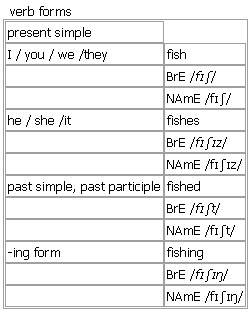|
Từ điển Oxford Advanced Learner 8th
 fish
fish

fish [fish fishes fished fishing] noun, verb BrE [f…™ É] NAmE [f…™ É]
noun (pl. fishor fishes) Fish is the usual plural form. The older form, fishes, can be used to refer to different kinds of fish.
1. countable a creature that lives in water, breathes through ‚Üëgills, and uses ‚Üëfins and a tail for swimming
• They caught several fish.
•tropical/marine/freshwater fish
•shoals (= groups) of fish
•a fish tank/pond
• There are about 30 000 species of fish in the world.
•The list of endangered species includes nearly 600 fishes.
•Fish stocks in the Baltic are in decline.
•In the pool she could see little silvery fish darting around.
see also ‚Üëcoarse fish, ‚Üëflatfish, ‚Üësea fish, ‚Üëshellfish, ‚Üëwet fish
2. uncountable the flesh of fish eaten as food
•frozen/smoked/fresh fish
•fish pie
• The chef's fish dishes are his speciality.
• Fish forms the main part of their diet.
more at a big fish (in a small pond) at ‚Üëbig adj., a cold fish at ‚Üëcold adj., a different kettle of fish at ‚Üëdifferent, drink like a fish at ‚Üëdrink v., be like shooting fish in a barrel at ‚Üëshoot v.
Word Origin:
Old English fisc (as a noun denoting any animal living exclusively in water), fiscian (verb), of Germanic origin; related to Dutch vis, vissen and German Fisch, fischen.
Collocations:
The living world
Animals
animals mate/breed/reproduce/feed (on sth)
fish/amphibians swim/spawn (= lay eggs)
birds fly/migrate/nest/sing
insects crawl/fly/bite/sting
insects/bees/locusts swarm
bees collect/gather nectar/pollen
spiders spin/weave a web
snakes/lizards shed their skins
bears/hedgehogs/frogs hibernate
insect larvae grow/develop/pupate
an egg/a chick/a larva hatches
attract/find/choose a mate
produce/release eggs/sperm
lay/fertilize/incubate/hatch eggs
inhabit a forest/a reef/the coast
mark/enter/defend (a) territory
stalk/hunt/capture/catch/kill prey
Plants and fungi
trees/plants grow/bloom/blossom/flower
a seed germinates/sprouts
leaves/buds/roots/shoots appear/develop/form
flower buds swell/open
a fungus grows/spreads/colonizes sth
pollinate/fertilize a flower/plant
produce/release/spread/disperse pollen/seeds/spores
produce/bear fruit
develop/grow/form roots/shoots/leaves
provide/supply/absorb/extract/release nutrients
perform/increase/reduce photosynthesis
Bacteria and viruses
bacteria/microbes/viruses grow/spread/multiply
bacteria/microbes live/thrive in/on sth
bacteria/microbes/viruses evolve/colonize sth/cause disease
bacteria break sth down/convert sth (into sth)
a virus enters/invades sth/the body
a virus mutates/evolves/replicates (itself)
be infected with/contaminated with/exposed to a new strain of a virus/drug-resistant bacteria
contain/carry/harbour (especially US) harbor bacteria/a virus
kill/destroy/eliminate harmful/deadly bacteria
Example Bank:
•He landed a big fish.
•He landed one very big fish.
•I cleaned and filleted the fish.
•Remove the skin and flake the cooked fish.
•The fish aren't biting today.
•The fish aren't biting= taking the bait today.
•This fish tastes funny.
•fish farmed in Canada
•the depletion of fish stocks
Idioms: ‚Üëa queer fish ‚ñ™ ‚Üëfish out of water ‚ñ™ ‚Üëhave other fish to fry ‚ñ™ ‚Üëneither fish nor fowl ‚ñ™ ‚Üëthere are plenty more fish in the sea
Derived: ‚Üëfish for something ‚ñ™ ‚Üëfish somebody out
 
verb
1. intransitive to try to catch fish with a hook, nets, etc
• The trawler was fishing off the coast of Iceland.
•~ for sth You can fish for trout in this stream.
2. intransitive go fishingto spend time fishing for pleasure
• Let's go fishing this weekend.
3. transitive ~ sth (for sth) to try to catch fish in the area of water mentioned
• They fished the loch for salmon.
4. intransitive + adv./prep. to search for sth, using your hands
•She fished around in her bag for her keys.
Verb forms: 
Word Origin:
Old English fisc (as a noun denoting any animal living exclusively in water), fiscian (verb), of Germanic origin; related to Dutch vis, vissen and German Fisch, fischen.
 
|
|
|
▼ Từ li√™n quan / Related words
Related search result for "fish"
|
|
